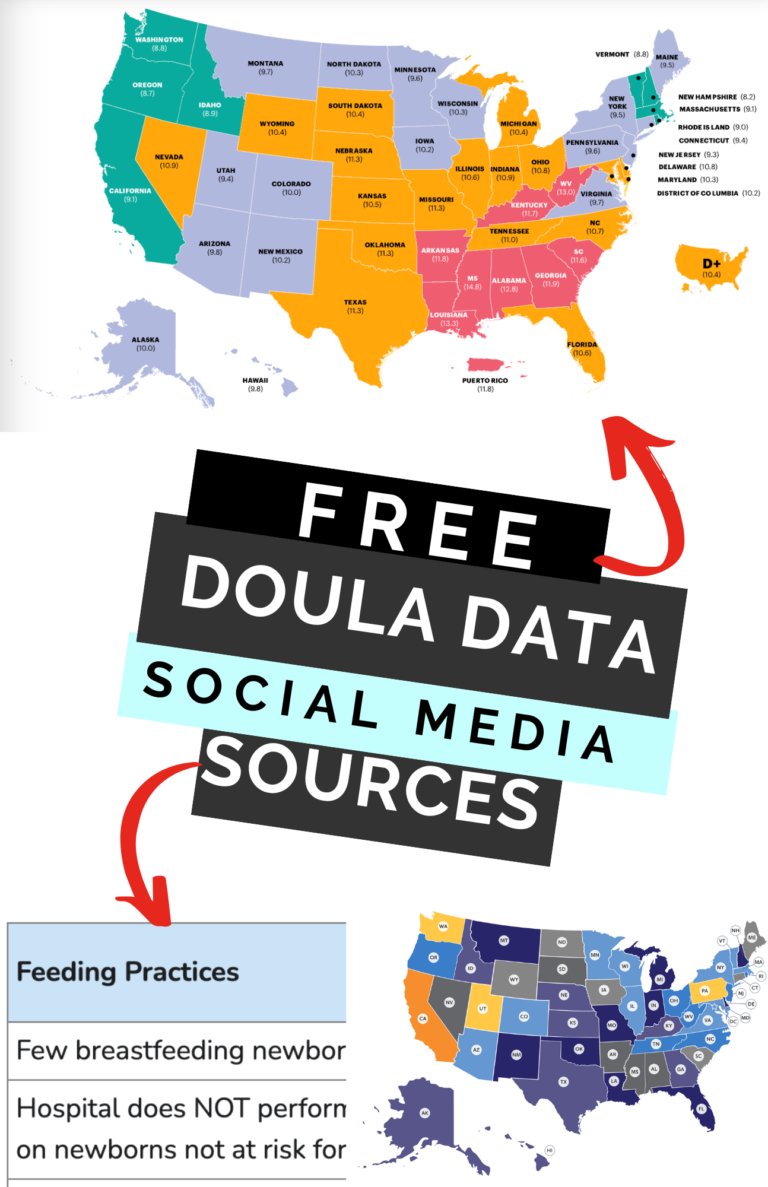
As a doula, you already know how vital it is to stay informed about maternal and infant health. But finding accurate, state-specific data to share with your audience? That can feel a bit overwhelming. The good news is, there are some fantastic, easy-to-access resources that can give you exactly what you need to fuel your social media content with impactful insights.
Sharing reliable stats doesn’t just position you as an expert in your field—it also helps educate families and potential clients while sparking meaningful conversations about what’s going on locally. Today, I’m sharing three essential data sources that you can start using in your posts, stories, or blogs to connect with your community.
1. PeriStats from March of Dimes
The PeriStats website from March of Dimes offers state-specific data on a range of maternal and infant health indicators. You can easily access preterm birth rates, infant mortality, and other crucial statistics to highlight key issues in your state.
Check out PeriStats here.
Why it’s useful: You can tailor your posts to your local community by sharing the preterm birth rates in your area and starting conversations about how doulas support families with preterm babies. Adding a local perspective builds trust with your audience by showing that you understand their specific challenges.
2. mPINC (Maternity Practices in Infant Nutrition and Care) from the CDC
The mPINC reports from the CDC provide insights into maternity practices related to breastfeeding. This data focuses on practices that support (or hinder) breastfeeding success, like hospitals offering formula to breastfeeding newborns. You can explore how your state compares to others and use these stats to encourage breastfeeding-friendly practices.
Explore mPINC data here.
Why it’s useful: Whether you’re sharing tips on breastfeeding support or discussing hospital policies in your state, mPINC data helps you provide evidence-backed advice. This positions you as not just a doula, but an advocate for positive changes in maternal health practices.
3. Maternal Mental Health Report Cards from the Policy Center for Maternal Mental Health
The Maternal Mental Health Report Cards offer a state-by-state breakdown of mental health care for pregnant and postpartum individuals. It’s a vital resource for doulas working with families navigating the emotional challenges of pregnancy and early parenting.
View the report cards here.
Why it’s useful: Mental health is such a crucial part of the postpartum journey, and these report cards can help you shine a light on the support (or lack of support) available in your state. Sharing this information in your content can help families feel more prepared and supported in their journey.
How to Use These Data Sources in Your Doula Business
Incorporating state-specific data into your social media posts is a simple way to educate your audience and engage with your community. Here’s how you can use these resources:
-
- Start Conversations: Use the data to spark discussions about issues that matter to your audience. For example, share local preterm birth rates and ask your followers about their experiences or thoughts on improving care for preterm babies.
-
- Build Trust: Demonstrate that you’re not just offering support but also staying up-to-date on the latest research. When potential clients see you sharing real, local data, it helps build credibility.
-
- Advocate for Change: Doulas are natural advocates. Use the mPINC data to raise awareness about hospital practices in your area that might need improvement, or share Maternal Mental Health Report Card stats to highlight the importance of mental health support in your state.
Ready to Dive In?
Sharing these powerful data points can give your content more depth and help families in your community feel informed and supported. Whether you’re talking about preterm birth rates, breastfeeding practices, or maternal mental health, these resources are a goldmine for any doula looking to provide evidence-based support.
Need help accessing these stats or figuring out how to use them in your content? Jump in to our friendly doula community.
Let’s make sure the families you support have access to the best information—starting with these three essential data sources.






